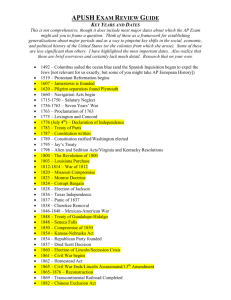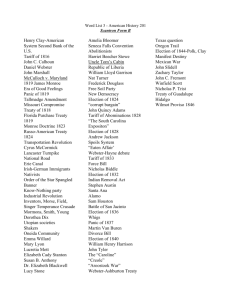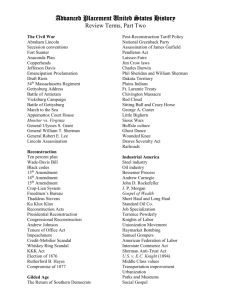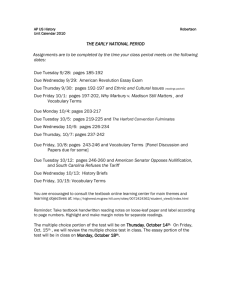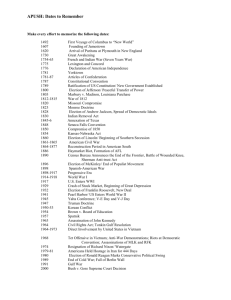AP US History Timeline (Terms by Decade)
advertisement
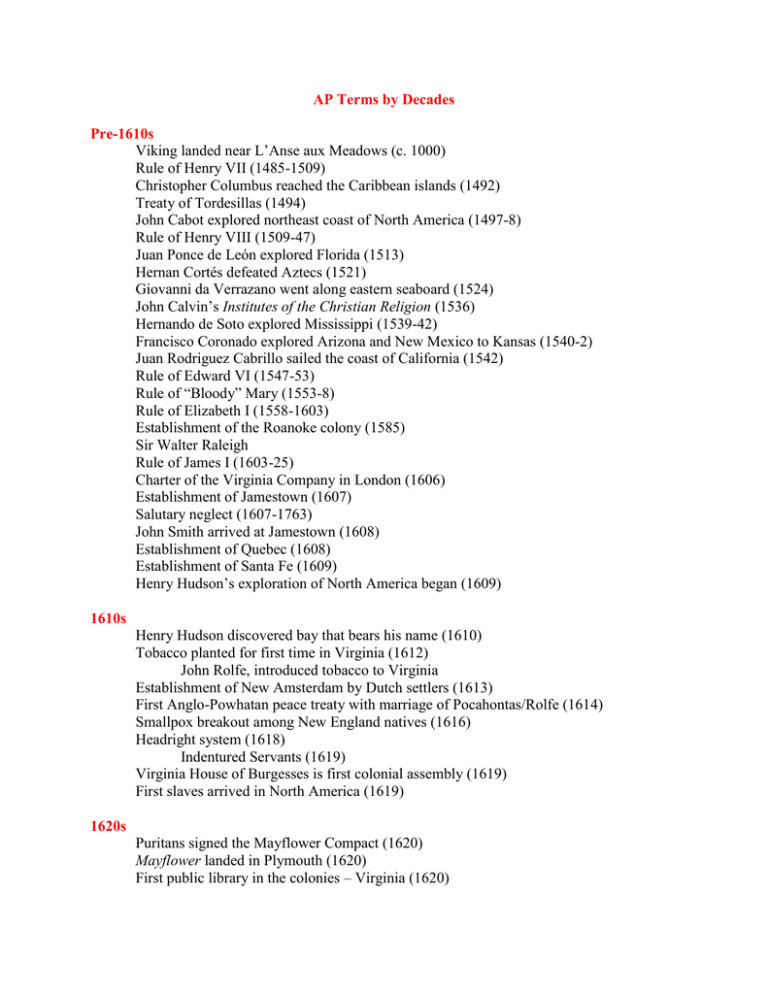
AP Terms by Decades Pre-1610s Viking landed near L’Anse aux Meadows (c. 1000) Rule of Henry VII (1485-1509) Christopher Columbus reached the Caribbean islands (1492) Treaty of Tordesillas (1494) John Cabot explored northeast coast of North America (1497-8) Rule of Henry VIII (1509-47) Juan Ponce de León explored Florida (1513) Hernan Cortés defeated Aztecs (1521) Giovanni da Verrazano went along eastern seaboard (1524) John Calvin’s Institutes of the Christian Religion (1536) Hernando de Soto explored Mississippi (1539-42) Francisco Coronado explored Arizona and New Mexico to Kansas (1540-2) Juan Rodriguez Cabrillo sailed the coast of California (1542) Rule of Edward VI (1547-53) Rule of “Bloody” Mary (1553-8) Rule of Elizabeth I (1558-1603) Establishment of the Roanoke colony (1585) Sir Walter Raleigh Rule of James I (1603-25) Charter of the Virginia Company in London (1606) Establishment of Jamestown (1607) Salutary neglect (1607-1763) John Smith arrived at Jamestown (1608) Establishment of Quebec (1608) Establishment of Santa Fe (1609) Henry Hudson’s exploration of North America began (1609) 1610s Henry Hudson discovered bay that bears his name (1610) Tobacco planted for first time in Virginia (1612) John Rolfe, introduced tobacco to Virginia Establishment of New Amsterdam by Dutch settlers (1613) First Anglo-Powhatan peace treaty with marriage of Pocahontas/Rolfe (1614) Smallpox breakout among New England natives (1616) Headright system (1618) Indentured Servants (1619) Virginia House of Burgesses is first colonial assembly (1619) First slaves arrived in North America (1619) 1620s Puritans signed the Mayflower Compact (1620) Mayflower landed in Plymouth (1620) First public library in the colonies – Virginia (1620) Peace treaty between Massasoit (Wampanoag Tribe) and Puritans (1621) William Bradford, governor of Plymouth (1621-57) Establishment of Dutch East Indies Company in New Amsterdam (1623) Establishment of New Hampshire by John Mason (1623) Establishment of Maine (part of Mass. Bay Colony) by Frederick Georges (1623) Rule of Charles I (1625-49) Peter Minuit’s bought Manhattan (1626) Establishment of Massachusetts Bay Colony by Puritans (1628) Charles I dissolved parliament (1620) John Winthrop elected governor of Massachusetts Bay Colony (1629) Cambridge Agreement (1629) 1630s Puritan’s Great Migration (1630s-40s) Boston established as political center of Massachusetts Bay Colony (1630) John Winthrop’s Model of Christian Charity (1630) Massachusetts’ extension of voting rights (1631) Pequot War (1633-7) Establishment of Maryland by Lord Baltimore (1634) Establishment of Connecticut (Hartford) by settlers from Massachusetts (1635) First public school in colonies – Boston Latin School (1635) Banishment of Roger Williams (1635) Establishment of Rhode Island and Providence by Roger Williams (1636) Founding of Harvard College (1636) Trial and banishment of Anne Hutchinson (1638) Establishment of New Haven by settlers from Massachusetts (1638) Establishment of Delaware by Swedish settlers (1638) First printing press in colonies – Cambridge, Massachusetts (1638) Fundamental Orders (1639) 1640s English Civil War – Roundheads v Cavaliers (1642-51) New England Confederation (1643) 2nd Anglo-Powhatan War (1644) Old Deluder Act (1647) Peter Stuyvesant, governor of New Amsterdam (1647-64) Act of Toleration (1649) Execution of Charles I (1649) Oliver Cromwell rule of England (1649) 1650s Navigation Law (1650) Rhode Island declared first prohibition against slavery (1652) First settlers in North Carolina from Virginia (1653) Dutch takeover of New Sweden (1655) 1660s Rule of Charles II (1660-85) Navigation Act (1660) Barbados slave code (1661) Halfway Covenant (1662) Navigation Act (1663) Establishment of Carolina by nobles loyal to Charles II (1670) Establishment of New York by Duke of York (1664) Establishment of New Jersey (1664) 1670s Navigation Act (1673) Sir Edmond Andros appointed governor of New Amsterdam (1674) King Philip’s (Metacom) War (1675-6) Bacon’s Rebellion (1676) 1680s Pueblo Revolt (1680) Popé Establishment of Pennsylvania by William Penn (1681) Robert de la Salle explored the Mississippi River and Louisiana basin (1682) Rule of James II (1685-88) Dominion of New England (1686) Sir Edmond Andros, governor of Dominion of New England (1686-92) Glorious Revolution (1688-9) Rule of William and Mary (1689-1702) Leisler’s Rebellion (1689) King Williams’ War (1689-97) 1690s John Locke’s Two Treatises of Government (1690) Salem Witch Trials (1692) Founding of William and Mary College (1693) Board of Trade of the Privy Council (1696) Navigation Act (1696) Woolens Act (1699) 1700s Deism (1700s) Five Nations (1700s) Colonial population reaches 275,000 (1700) Establishment of Detroit by Antoine Cadillac (1701) Founding of Yale College (1701) Rule of Queen Anne (1702-14) Queen Anne’s War (1702-13) Establishment of the United Kingdom (1707) 1710s Parliament passed the Post Office Act for the colonies (1710) Carolina splits into North and South (1712) Slave uprising in New York City (1712) Treaty of Utrecht ended Queen Anne’s War (1713) Introduction of tea into the American colonies (1714) Rule of George I (1714-27) Establishment of New Orleans (1718) 1720s Colonial population reaches 475,000 (1720) Robert Walpole, prime minister of the United Kingdom (1721-42) Rule of George II (1727-60) Establishment of Baltimore (1729) 1730s Great Awakening (1730s-1740s) Old and New Lights George Whitefield, New Light minister William and Gilbert Tennant, New Light ministers Hat Act (1732) Benjamin Franklin’s Poor Richard’s Almanack (1732) Establishment of Georgia (Savannah) (1733) James Oglethorpe, reformer and Georgia founder Molasses Act (1733) John Peter Zenger Trial (1734-5) Stono Rebellion (1739) War of Jenkins’ Ear (1739-43) 1740s Jonathan Edwards’ “Sinners in the Hands of an Angry God” (1741) Czar Peter the Great sponsored expedition of Alaska’s coast (1741) King George’s War (1744-8) Founding of Princeton (College of New Jersey) (1746) 1750s Iron Act (1750) Currency Act (1751) Founding of Pennsylvania College or The Academy (1751) Albany Plan of Union (1754) Founding of Columbia (King’s College) (1754) French and Indian War (1754-63) British expels French Canadians from Canada (1755) Cherokee War (1758-61) 1760s Writs of Assistance (1760s-70s) Colonial population at 1.5m (1760) Rule of George III (1760-1820) Treaty of Paris ends the French and Indian War (1763) Proclamation of 1763 Paxton Revolt (1763) Wilkes Affair (1763) Pontiac’s Rebellion (1763-6) George Grenville, prime minister of the United Kingdom (1763-5) Sugar Act (1764) Currency Act (1764) Founding of Brown (Rhode Island College) (1764) Stamp Act (1765) Virtual representation Sons and Daughters of Liberty (1765) Sam Adams, founder of the Sons of Liberty Quartering Act (1765) Attack on home of Thomas Hutchinson (1765) Stamp Act Congress (1765-6) Edmund Burke, member of Parliament (1765-80) Founding of Rutgers (Queen’s College) (1766) Parliament repealed the Stamp Act (1766) Declaratory Act (1766) Townsend Act (1767) Regulator Movement (1767-71) “Letters from a Farmer in Pennsylvania” (1767) John Dickinson, Pennsylvania and Delaware politician Massachusetts Circular Letter (1768) Father Junipero Serra set up first mission in San Diego (1769) Founding of Dartmouth College (1769) 1770s Colonial population at 2.2m (1770) Lord North, prime minister of Great Britain (1770-82) The Shakers (1770-) Boston Massacre (1770) Crispus Attucks, first casualty of Boston shooting Parliament repealed most of Townsend Acts (1770) Thomas Hutchinson, governor of Massachusetts (1771-4) Gaspeé incident (1772) Tea Act (1773) Boston Tea Party (1773) Committees of correspondence (1773) Coercive Acts /Intolerable Acts (1774) Quebec Act (1774) First Continental Congress (1774) Declaration of Rights and Grievances (1774) The Association (1774) Patrick Henry declared “Give me liberty or give me death” (1775) First anti-slavery society by Philadelphia Quakers (1775) Battles of Lexington (“Shot heard ‘round the world”) and Concord (1775) Paul Revere and William Dawes Second Continental Congress (1775) Battle of Bunker Hill (Breeds Hill) (1775) Olive Branch Petition (1775) Declaration of the Causes and Necessities of Taking Arms (1775) George Washington as Continental Commander (1775) Lord Dunmore’s emancipation (1775) Richard Henry Lee’s Resolution (1776) Thomas Paine’s Common Sense (1776) Declaration of Independence (1776) Thomas Jefferson, Virginia representative Thomas Hobbs, John Locke, Baron de Montesquieu Abigail Adams, wife of John Adams Marquis de Lafayette and Baron von Steuben Benedict Arnold and John Paul Jones and the Bonhomme Richard Battles of Saratoga, Valley Forge and Yorktown Articles of Confederation (1777) Franco-American Alliance (1778) Virginia Statue of Religious Freedom (1779) 1780s Lord Cornwallis’ surrender at Yorktown (1781) Newburgh Conspiracy (1783) Treaty of Paris ended War for Independence (1783) Land Ordinance Act (1785) Shays’ Rebellion (1786) Annapolis Convention (1786) Virginia Statue for Religious Freedom (1786) Constitutional Convention (1787) Federalists and Anti-Federalists Virginia and New Jersey Plans (1787) The Great Compromise (1787) 3/5th Compromise (1787) Northwest Ordinance (1787) Federalist Papers (1787-8) Alexander Hamilton, James Madison, John Jay Ratification of the U.S. Constitution (1788) George Washington administration (1789-97) First cabinet departments (State, Treasury, War, Attorney General) (1789) Judiciary Act of 1789 Revenue Act (Tariff Act) of 1789 French Revolution (1789) 1790s Second Great Awakening (1790s) George Washington administration (1789-97) Report on Public Credit (1790) Haitian Revolution (1791-1804) Toussaint L’Overture Report on Manufactures (1791) Bank of the United States (1791) Elastic or necessary and proper clause Bill of Rights (1791) Excise (Whiskey) tax (1791) Citizen Genêt (1793) French Revolution’s Reign of Terror (1793) Neutrality Proclamation (1793) Eli Whitney’s cotton gin (1794) Battle of Fallen Timbers (1794) General “Mad” Anthony Wayne Whiskey Rebellion (1794) Jay’s Treaty (1795) Pinckney Treaty (1795) Treaty of Greenville (1795) Washington’s Farewell Address (1796) General election of 1796 – Adams, Jefferson, Pinckney, Burr John Adams administration (1797-1801) XYZ Affair (1797) Talleyrand, French foreign minister Eli Whitney’s interchangeable parts (1798) Alien and Sedition Acts (1798) Virginia and Kentucky Resolutions (1798-9) nullification 1800s Impressment Convention of 1800 Prosser’s (Gabriel’s) Rebellion (1800) Treaty of Sam Ildefonso (1800) Washington, D.C. became nation’s capital (1800) General election of 1800 – Jefferson, Burr, Adams, Pinckney Thomas Jefferson administration (1801-9) Albert Gallatin, Treasury Secretary John Marshall, Chief Justice (1801-1835) Barbary War (1801-5) Judiciary Act (1801) Midnight Judges (1801) Repeal of excise tax (1802) Marbury v. Madison (1803) Louisiana Purchase (1803) Twelfth Amendment (1803) General election of 1804 – Jefferson v Pinckney Impeachment of Justice Samuel Chase (1804-5) Burr Conspiracy (1804-7) Lewis and Clark expedition (1804) Robert Fulton’s steamboat (1807) Chesapeake Affair (1807) Embargo Act (1807) Slave importation ban (1808) General election of 1808 – Madison v. Pinckney James Madison administration (1809-17) Non-Intercourse Act (1809) 1810s Macon’s Bill No. 2 (1810) Fletcher v. Peck (1810) War Hawk Congress (1810-2) Battle of Tippacanoe (1811) William Henry Harrison Tecumseh and the Prophet War of 1812 General election of 1812 – Madison v. Clinton Francis Scott Key and the Star-Spangled Banner (1812) Fort McHenry, Baltimore, Maryland Essex Junto (1812-4) Hartford Convention (1814) Treaty of Ghent ends War of 1812 (1814) Battle of New Orleans (1815) Second Bank of the United States (1816) Tariff of 1816 General election of 1816 – Monroe v. King Rush-Bagot Treaty (1817) Andrew Jackson’s invasion of Florida against Seminoles (1817) James Monroe administration (1817-25) Era of Good Feelings Convention of 1818 Emma Willard’s Plan for Improving Female Education (1818) McCulloch v. Maryland (1819) Dartmouth College v. Woodward (1819) Adams-Onís Treaty (1819) Panic of 1819 1820s Washington Irving’s The Sketch Book (1820) Tallmadge and Thomas Amendments (1820) Missouri Compromise (1820) 36’30” General election of 1820 – Monroe v. Adams Cohens v. Virginia (1821) First American settlement in Texas (1822) Stephen F. Austin Monroe Doctrine (1823) James Fennimore Cooper’s Leatherstocking Tales (1823) American System – Henry Clay (1824) Gibbons v. Ogden (1824) General election of 1824 – Adams, Jackson, Clay, Crawford “corrupt bargain” (1824) John Quincy Adams administration (1825-9) Cumberland (National) Road (1825) Lyceum Movement (1825) Erie Canal (1825) James Fennimore Cooper’s The Last of Mohicans (1826) American Temperance Society (1826) General election of 1828 – Jackson v. Adams Anti-Masons Party (1828) Tariff of 1828 (Tariff of Abominations) Nullification Crisis (1828-33) Andrew Jackson administration (1828-37) Kitchen Cabinet Spoils System 1830s Horace Mann’s education reform (1830s-40s) Grimke Sisters (1830s-50s) Lowell System (1830s-50s) Whig Party (1830s-50s) Nativists (1830s-1900s) Founding of the Church of Jesus Christ of Latter-day Saints (1830) Joseph Smith Maysville Road veto (1830) Webster-Hayne debates (1830) Indian Removal Act (1830) Peggy Eaton Affair (1830-1) Alexis de Tocqueville’s Democracy in America (1831) Nat Turner’s Rebellion (1831) William Lloyd Garrison’s The Liberator (1831-65) Cherokee Nation v. Georgia (1831) Worcester v. Georgia (1832) Resignation of VP John Calhoun (1832) Bank War (1832-7) Nicolas Biddle, Bank of US president General election of 1832 – Jackson v. Clay American Anti-Slavery Party (1833) Founding of Oberlin College (1833) Compromise Tariff of 1833 Force Act of 1833 Texas war for independence (1835-6) Sam Houston Antonio Lopez de Santa Anna Cyrus McCormick’s mechanical reaper (1835) Charles Finney’s Lectures on Revivals of Religion (1835) Battle at the Alamo (1836) Battle of San Jacinto (1836) Texas Republic (1836-45) Rio Grande or Nueces River Founding of Mt. Holyoke Seminary (1836) Ralph Waldo Emerson’s Nature (1836) Transcendentalism Gag rule (1836) Specie circular (1836) General election of 1836 – Van Buren v. Harrison, Webster, White Martin Van Buren administration (1837-41) Charles River Bridge v. Warren Bridge (1837) Panic of 1837 Trail of Tears (1838-9) Frederick Douglass’ The North Star (1838-51) Theodore Weld’s “American slavery as it is” (1839) Panic of 1839 1840s Manifest Destiny (1840s-50s) Hudson River School of Art (1840s) Dorothea Dix and mental health reform (1840s) The Dial and Margaret Fuller (1840-2) General election of 1840 – Harrison v. Van Buren William Henry Harrison administration (1841) Death of William Henry Harrison (1841) John Tyler administration (1841-45) Brook Farm (1841) Oregon Trail (1842-1850s) Oregon Fever Dorr’s Rebellion (1842) Webster-Ashburton Treaty (1842) Prigg v. Pennsylvania (1842) Commonwealth of Massachusetts v. Hunt (1842) Elias Howe’s sewing machine (1844) Samuel Morse’s display of the telegraph machine (1844) The Millerites (1844) General election of 1844 – Polk v. Clay James K. Polk administration (1845-49) Annexation of Texas (1845) Frederick Douglass’ Narrative of the Life of Frederick Douglass (1845) Mexican-American War (1846-8) Spot resolutions Zachary Taylor and Winfield Scott Wilmot Proviso (1846) Oregon Treaty (1846) 54’40” or Fight (1846) Bear Flag Republic (1846) John Fremont Free Soil Party (1848-52) Treaty of Guadalupe Hidalgo (1848) Nicolas Trist Seneca Falls Declarations of Sentiments and Resolutions (1848) Elizabeth Cady Stanton, Lucretia Mott The Oneida Community (1848) Sutter’s Mill – gold discovery (1848) General election of 1848 – Taylor v. Cass The California Gold Rush (1849) Henry David Thoreau’s Civil Disobedience (1849) Zachary Taylor administration (1849-50) 1850s “King Cotton” (1850s) Height of Harriet Tubman’s Underground Railroad (1850s) Know Nothing (American) Party (1850s) Death of Zachary Taylor (1850) Millard Fillmore administration (1850-3) Compromise of 1850 Henry Clay, John Calhoun, Daniel Webster (Great Compromisers) Stricter fugitive slave law Sen. Stephen Douglas (D-IL) and popular sovereignty Nathaniel Hawthorne’s The Scarlet Letter (1850) Clayton-Bulwer Treaty (1850) Herman Melville’s Moby Dick (1851) Harriet Beecher Stowe’s Uncle Tom’s Cabin (1852) General election of 1852 – Pierce v. Scott Gadsden Purchase (1853) Franklin Pierce administration (1853-7) Henry David Thoreau’s Walden (1854) Treaty of Kanagania (1854) Commodore Matthew Perry Amana Colonies (1854) Kansas-Nebraska Act (1854) Steven Douglas Bleedin’ Kanas (1854-8) John Brown Lawrence and Pottawattamie Creek Republican Party (1854) Ostend Manifesto (1854) George Fitzhugh’s Sociology for the South (1854) Copperheads (late 1850s) Walt Whitman’s Leaves of Grass (1855) Summer-Brooks Affair (1856) General election of 1856 – Buchanan v. Fremont James Buchanan administration (1857-61) Dred Scott v. Sanford (1857) Chief Justice Roger Taney Panic of 1857 Hinton Helper’s The Impending Crisis of the South (1857) Lecompton Constitution (1857) Lincoln-Douglas Debates (1858) Freeport Doctrine (1858) Lincoln’s “House Divided” speech (1858) Comstock Lode (1859) Ableman v. Booth (1859) Harper’s Ferry assault (1859) 1860s Crittenden Compromise (1860) General election of 1860 – Lincoln, Breckenridge, Douglas, Bell Constitutional Union Party (1860) Fort Sumter (1860) Abraham Lincoln administration (1861-5) American Civil War (1861-5) George McClellan, Ulysses S. Grant, Robert E. Lee Battle of Bull Run (1861) ironclads (Merrimack and Monitor) Confederate States of America (1861-5) Jefferson Davis and Alexander Stephens Dorothea Dix as Superintendent of Union Nurses (1861) Greenbacks (1862-75) Homestead Act (1862) Morrill Land Grant Act of 1862 Pacific Railway Act (1862) Union Pacific Railroad, Central Pacific Railroad Battle of Antietam (1862) Molly Maguires (1862-76) Emancipation Proclamation (1863) Battle of Gettysburg (1863) Gettysburg Address (1863) New York Draft Riots (1863) Proclamation of Amnesty and Reconstruction (1863) Wade-Davis Bill (1864) General election of 1864 – Lincoln v. McClellan Surrender at Appomattox Court House (1865) Assassination of Abraham Lincoln (1865) John Wilkes Booth Radical Republicans Thaddeus Stevens, U.S. senator Thirteenth Amendment (1865) Horace Greeley’s “Go West, young man” (1865) Andrew Johnson administration (1865-9) National Labor Union (1866) Civil Rights Bill of 1866 Alaska purchase (1867) National Grange of Patrons of Husbandry (1867) Tenure of Office Act (1867) Secretary of War William Seward Military Reconstruction Act (1867) black codes Ku Klux Klan carpetbaggers and scalawags Freedman’s Bureau (1867-72) General Oliver Howard, director of Freedmen’s Bureau Fourteenth Amendment (1868) Johnson impeachment trial (1868) General election of 1868 – Grant v. Seymour “waving the bloody shirt”/”vote as you shot” Ulysses S. Grant administration (1869-77) Knights of Labor (1869-1949) Transcontinental Railroad and Promontory Point (1869) Jay Gould/Jim Fiske and Black Friday (1869) 1870s Gilded Age (1870s-90s) Ghost Dance (1870s-90s) Gold and Silver Bugs (1870s-90s) Robber Barons (1870s-1900s) horizontal and vertical integration agribusiness interlocking directorates Social Darwinism (1870s-1900s) laissez-faire (1870s-1930s) End of Tammany Hall (1870s) Jim Crow laws (1870s) Hiram Revels, first black senator elected (1870) Fifteenth Amendment (1870) Grandfather Clause Force Acts (1870-1) Standard Oil Company (1870) Yellowstone National Park (1872) U.S. Steel (1872) Credit Mobilier scandal (1872) General election of 1872 – Grant v. Greeley Panic of 1873 Chautauqua Movement (1874) Resumption Act of 1875 Civil Rights Act of 1875 Mississippi Plan (1875) Greenback Party (c. 1876-84) Little Big Horn (1876) George Custer, Sitting Bull Farmers’ Alliance (1876) General election of 1876 – Hayes v. Tilden Compromise of 1877 Rutherford B. Hayes administration (1877-81) Capture of Chief Joseph (1877) Redeemers Munn v. Illinois (1877) Great Railroad Strike (1877) Halfbreeds and Stalwarts (late 1870s) Roscoe Conklin, U.S. senator and lead Stalwart Bland-Allison Act (1878) Exodusters (1878-9) closed shops and yellow dog contracts Species Resumption Act (1879) Christian Scientists (1879) Mary Baker Eddy 1880s General election of 1880 – Garfield v. Hancock James Garfield administration (1881) Assassination of James Garfield (1881) Charles Guiteau Chester Arthur administration (1881-5) Pendleton Civil Service Act (1881) Tuskegee Institute (1881) Booker T. Washington and his “Atlanta Compromise” Chinese Exclusion Act (1882) Denis Kearney and Workingmen’s Party General election of 1884 – Cleveland v. Blaine Mugwumps (1884) Grover Cleveland administration (1885-9) Josiah Strong’s Our Country (1885) Wabash, St. Louis and Pacific Railroad Company v. Illinois (1886) Haymarket Square Riot (1886) American Federation of Labor (1886) Samuel Gompers Interstate Commerce Act (1887) Interstate Commerce Commission American Protective Association (1887) Dawes Severalty Act (1887) General election of 1888 – Harrison v. Cleveland Benjamin Harrison administration (1889-93) Jane Addams and the Hull House (1889) Andrew Carnegie’s Gospel of Wealth (1889) Jacob Riis’ How the Other Half Lives (1889) 1890s Benjamin Harrison administration (1889-93) Yellow Journalism (1890s) William Randolph Hearst, Joseph Pulitzer Frederick Taylor and scientific management (1890s-1910s) Social Gospel Movement (1890s-1920s) Walter Rauschenbusch, Washington Gladden, Dwight L. Moody United Mine Workers (1890) Mother Jones Morrill Land Grant Act (1890) Battle of Wounded Knee (1890) Sherman Anti-Trust Act (1890) Sherman Silver Purchase Act (1890) McKinley Tariff (1890) Mississippi Plan (1890) Baltimore Affair (1891) Hawaiian Queen Liliuokalani (1891-3) Homestead Strike (1892) General election of 1892 – Cleveland v. Harrison Populist Party (1892) Tom Watson, James Weaver, Bill Tillman, Mary Lease, William J. Bryan Grover Cleveland administration (1893-7) Frederick Turner’s Frontier Thesis (1893) Panic of 1893 Pullman Car Company Strike (1894) American Railway Union Eugene Debs In Re Debs (1894) Wilson-Gorman Tariff (1894) Coxey’s Army (1894) United States v. E.C. Knight Company (1895) Venezuelan border dispute (1895) Plessy v. Ferguson (1896) General election of 1896 – McKinley v. Bryan William Jennings Bryan’s “Cross of Gold Speech” (1896) William McKinley administration (1897-1901) Annexation of Hawai’i (1898) U.S.S. Maine (1898) de Lome letter (1898) Spanish-American War (1898) Teddy Roosevelt and the Rough Riders (1898) Emilio Aguinaldo Teller Amendment (1898) Treaty of Paris (1898) Guam, Puerto Rico, Philippines American Anti-Imperialist League (1898) Filipino War (1899-1900) Open Door Policy (1899) Secretary of State John Hay John Dewey’s The School and Society (1899) Thorstein Velben’s The Theory of the Leisure Class (1899) 1900s Muckrakers (1900s-10s) Jacob Riis, Lincoln Steffens, Ida Tarbell, Upton Sinclair, Thorstein Velben Boxer Rebellion (1900) General election of 1900 – McKinley v. Bryan Assassination of William McKinley (1901) Theodore Roosevelt administration (1901-9) Square Deal Gifford Pinchot Progressive Era (1901-20) recall, referendum, initiative, secret ballot Robert La Follette, Sr. and the Wisconsin Experiment The Anti-Saloon League Women’s Christian Temperance Union Carrie Nation, Francis Willard National American Woman Suffrage Association Elizabeth Cady Stanton, Susan B. Anthony, Carrie Chapman Catt National Woman’s Party Alice Paul Platt Amendment (1901) Hay-Pauncefote Treaty (1901) insular cases (1901-4) Newlands Reclamation Act (1902) Elkins Act (1903) Hay-Bunau-Varilla Treaty (1903) Wright Brothers – first flight (1903) General election of 1904 – Roosevelt v. Parker Roosevelt Corollary (1904) Lincoln Steffens’ The Shame of the Cities (1904) Ida Tarbell’s History of the Standard Oil Company (1904) Treaty of Portsmouth (1905) Industrial Workers of the World (1905) Bill Haywood, Emma Goldman, Eugene Debs, Daniel De Leon Niagara Movement (1905) W.E.B. du Bois Hepburn Act (1906) Upton Sinclair’s The Jungle (1906) Meat Inspection Act (1906) Pure Food and Drug Act (1906) Ashcan School of Art (1907) Gentlemen’s Agreement (1907) Great White Fleet (1907-9) Root-Takahira Agreement (1908) Muller v. Oregon (1908) Henry Ford and the Model T (1908) assembly line General election of 1908 – Taft v. Bryan William Howard Taft administration (1909-13) Dollar Diplomacy Payne-Aldrich Tariff (1909) National Association for the Advancement of Colored People (1909) 1910s Margaret Sanger and birth control advocacy (1910s) Harlem Renaissance (1910s-30s) Mann-Elkins Act (1910) Mexican Revolution (1910-7) Pancho Villa, Emiliano Zapata, Porfirio Diaz, Francisco Madero, Venustiano Carranza Triangle Shirtwaist Factory fire (1911) US occupation of Nicaragua (1912-33) General election of 1912 – Wilson, Taft, Roosevelt, Debs New Freedom (Wilson), New Nationalism (Roosevelt) Woodrow Wilson administration (1913-21) Moral Diplomacy “Triple Wall of Privilege” Sixteenth Amendment (1913) Seventeenth Amendment (1913) Federal Reserve Act and System (1913) Underwood-Simmons Tariff (1913) Federal Trade Commission (1914) Clayton Anti-Trust Act (1914) United Negro Improvement Association (1914) Marcus Garvey Assassination of the Archduke Franz Ferdinand (1914) World War I (1914-8) Sinking of the Lusitania (1915) Birth of a Nation (1915) US occupation of Haiti (1915-37) John Dewey’s Democracy and Education (1916) Federal Highways Act (1916) Sussex Pledge (Ultimatum) of 1916 Jones Act of 1916 General election of 1916 – Wilson v. Hughes Jones (Shafroth) Act of 1917 Lansing-Ishii Agreement (1917) Zimmerman Note (1917) Selective Service Act of 1917 Creel Committee on Public Information (1917) War Industries Board (1917) Bernard Baruch Communist Revolution (1917) Vladimir Lenin Espionage Act of 1917 Sedition Act of 1918 Wilson’s Fourteen Points and the League of Nations Eighteenth Amendment (1919) Treaty of Versailles (1919) Article X (1919) Henry Cabot Lodge Volstead Act (1919) Schenck v. U.S. (1919) Attorney General Alexander Mitchell Palmer (1919-21) Palmer Raids Benito Mussolini’s Fascist Party (1919) 1920s The Lost Generation (1920s) The Jazz Age (1920s) Flappers Speakeasies (1920s) Red Scare (1920s) The Great Migration (1920s-30s) Nineteenth Amendment (1920) League of Women Voters (1920) General election of 1920 – Harding v. Cox Warren Harding administration (1921-3) The Ohio Gang (1921-3) Teapot Dome Scandal (1921-3) Interior Secretary Albert Fall Washington Naval Armament Conference (1921) Sacco and Vanzetti trial (1921) Nine Power Treaty (1923) Warren Harding’s death (1923) Calvin Coolidge administration (1923-9) Immigration Act of 1924 National Origins Act of 1924 The Dawes Plan (1924) General election of 1924 – Coolidge v. Davis (La Follette) The Scopes “Monkey” Trial (1925) McNary-Haugen Bill (1927) Kellogg-Briand Act (1928) General election of 1928 – Hoover v. Smith Herbert Hoover administration (1929-33) Black Tuesday/Stock Market crash (1929) Hoovervilles (1929) 1930s Dust Bowl (1930s) Okies (1930s) Great Depression (1930s) Hoovervilles (1930s) Smoot-Hawley Tariff Act (1930) Hoover Dam construction (1930) Star-Spangled Banner made the national anthem (1931) Reconstruction Finance Corporation (1932) Hoover-Stimson Doctrine (1932) Bonus Army (1932) General election of 1932 – Roosevelt v. Hoover Franklin D. Roosevelt administration (1933-45) fireside chats The Brain Trust (1933-45) Black Cabinet The New Deal (1933) First hundred days (1933) The Three R’s (1933) National Industrial Recovery Administration (NIRA) of 1933 Section 7a (1933) Agricultural Adjustment Act (AAA) of 1933 Civilian Conservation Corps (CCC) of 1933 Emergency Banking Relief Act of 1933 Glass-Steagall Act/FDIC (1933) National Recovery Administration (NRA) of 1933 Public Works Administration (PWA) of 1933 Tennessee Valley Authority (TVA) of 1933 Adolf Hitler as the German chancellor (1933) Montevideo Conference (1933) London Economic Conference (1933) Good Neighbor Policy Dr. Francis Townsend and the Townsend Plan (1933) Securities and Exchange Commission (1934) Indian Reorganization Act (1934) Tydings-McDuffie Act (1934) American Liberty League (1934-40) Sen. Huey Long (D-LA) and Share Our Wealth Program (1934) Assassination of Huey Long (1935) National Labor Relations Act (NLRA) of 1935 Works Progress Administration (WPA) OF 1935 Social Security Act of 1935 Judicial Reorganization Bill or the Court Packing bill (1935) United Auto Workers (1935) Spanish Civil War (1935-8) Francisco Franco Neutrality Acts (1935, 36, 37, 39) Military overthrow of Japanese government (1936) General election of 1936 – Roosevelt v. Landon Roosevelt’s Quarantine Speech (1937) The Second New Deal (1937) Congress of Industrial Organizations (1938) Fair Labor Standards Act (1938) Munich Conference (1938) Conservative Coalition (1938) House Un-American Activities Committee or HUAC (1938-75) World War II (1939-45) Hatch Act (1939) Neutrality Act of 1939 Cash-and-Carry (1939) Office of Price Administration (OPA) of 1939 1940s Bracero program (1940s) Destroyers for Bases (1940) Smith Act (1940) Selective Training and Service Act (1940) General election of 1940 – Roosevelt v. Wilkie Lend-Lease Act (1941) Tojo Hideki as Japan’s prime minister (1941-4) Fair Employment Practices Committee (1941) Pearl Harbor (1941) Women’s Army Auxiliary Corps or WAAC (1941) Women Appointed for Voluntary Emergency Service or WAVES (1942) Women’s Auxiliary Ferrying Squadron or WAFS (1942) Voice of America (1942) Navajo Code Talkers Office of War Information (OWI) of 1942 Office of War Mobilization (OMW) of 1942 Wannsee Conference (1942) The Holocaust (1942-5) Manhattan Project (1942-6) J. Robert Oppenheimer Executive Order 9066 (1942) Casablanca Conference (1943) Zoot Suit Riots (1943) Cairo Conference (1943) Tehran Conference (1943) Ayn Rand’s The Fountainhead (1943) G.I. Bill (1944) Korematsu v. United States (1944) island hopping campaign (1944-5) D-Day (1944) Charles de Gaulle French Resistance General election of 1944 – Roosevelt v. Dewey Battle of the Bulge (1945) Yalta Conference (1945) Harry S. Truman administration (1945-53) kamikazes (1945) German and Japan’s surrender (1945) Potsdam Conference (1945) Hiroshima and Nagasaki (1945) United Nations (1945) International Monetary Fund or IMF (1945) Nuremberg International Tribunal (1945) End of Chinese Civil War (1945-7) Chinese Community Party, Kuomintang Mao Zedong and Chiang Kai-Shek Tokyo International Tribunal (1946) Employment Act of 1946 Iran Crisis (1946) Winston Churchill’s “Iron Curtain” speech (1946) satellite countries (1946-91) Josef “Marshall” Tito Taft-Hartley Act (1947) National Security Act (1947) Department of Defense (1947) Central Intelligence Agency (1947) Truman Doctrine (1947) George Kennan’s containment policy (1947) UN Partition Plan for Israel and Palestine (1947) Fall of China (1948) Marshall Plan (1948) Organization of American States or OAS (1948) General election of 1948 – Truman v. Dewey; Thurmond and Wallace Berlin Airlift (1948-9) North Atlantic Treaty Organization or NATO (1949) Harry Truman’s Fair Deal (1949) 1950s Civil Rights Movement (1950s-70s) Baby boom generation (1950s) Korean War (1950-3) 38th Parallel McCarran Internal Security Act (1950) Julius and Ethel Rosenberg (1950) Alger Hiss (1950) McCarthyism (1950-5) European Economic Community (1951) Twenty-second Amendment (1951) General election of 1952 – Eisenhower v. Stevenson Dwight D. Eisenhower administration (1953-61) John Foster Dulles, Secretary of State Eisenhower Doctrine domino theory massive retaliation Soviet Premier Nikita Khrushchev (1953-64) Warren Court (1953-69) Overthrow of Iran’s Mohammad Mossadegh (1953) Brown v. Board of Education of Topeka, Kansas (1954) Battle of Dienbienphu (1954) Ho Chi Minh Geneva Conference (1954) AFL-CIO merger (1955) Warsaw Pact (1955) Geneva Summit (1955) Southeast Asian Treaty Organization or SEATO (1955) Central Treaty Organization or CENTO (1955) Jonas Salk’s polio vaccine (1955) Montgomery Bus Boycott (1955-6) Rosa Parks, Civil Rights activist Martin Luther King, Jr., Civil Rights activist Aswan Dam (1956) Gamal Abdul Nasser, president of Egypt National Highway Act (1956) Hungarian Uprising (1956) Suez Canal crisis (1956) General election of 1956 – Eisenhower v. Stevenson beatniks (late 1950s-60s) Sputnik (1957) Civil Rights Act of 1957 Little Rock’s Central High School and the Little Rock Nine (1957) Southern Christian Leadership Conference (1957) Teamsters President Jimmy Hoffa (1957-71) National Defense Education Act (1958) National Aeronautics and Space Administration (1958) John Birch Society (1958) St. Lawrence Seaway (1959) Cuban Revolution (1959) Fidel Castro, dictator of Cuba (1959-2008) Alaska and Hawai’i enter the Union (1959) 1960s Height of the Nation of Islam and Malcolm X (1960s) U-2 Spy Incident (1960) Student Non-Violent Coordinating Committee or SNCC (1960) General election of 1960 – Kennedy v. Nixon John F. Kennedy administration (1961-3) New Frontier Bay of Pigs (1961) Freedom Summer (1961) Freedom Riders (1961) Peace Corps (1961) Alliance for Progress (1961) Berlin Wall (1961-89) Baker v. Carr (1962) Engel v. Vitale (1962) Port Huron Statement (1962) Students for a Democratic Society (1962) John Glenn orbits the Earth – first American to do so (1962) Rachel Carson’s Silent Spring (1962) Cuban Missile Crisis (1962) Red phone United Farm Workers of America (1962) Cesar Chavez, Dolores Huerta Letter from a Birmingham Jail (1963) March on Washington (1963) “I Have a Dream” speech (1963) Gideon v. Wainwright (1963) Assassination of John F. Kennedy (1963) Lee Harvey Oswald, assassin Jack Ruby, Oswald’s killer Lyndon B. Johnson administration (1963-9) Warren Commission (1963-4) Betty Friedan’s The Feminine Mystique (1963) Nuclear Test Ban Treaty (1963) Berkeley Free Speech Movement (1964-5) Mario Savio Civil Rights Act of 1964 Twenty-Fourth Amendment (1964) Gulf of Tonkin Resolution (1964) General election of 1964 – Johnson v. Goldwater Vietnam War (1964-73) Vietcong Ho Chi Minh Trail Watts (Los Angeles) neighborhood riots (1965) Voting Rights Act of 1965 Great Society and the war on poverty (1965) Medicare, Medicaid, Food Stamps Immigration Act of 1965 Ralph Nader, safety activist Assassination of Malcolm X (1965) Black Panthers (1966-1980s) black power Stokely Carmichael, SNCC President Miranda v. Arizona (1966) Department of Housing and Urban Development (1966) Department of Transportation (1966) Office of Equal Opportunity (1966) National Organization for Women (1966) Counter Culture Movement or Hippies (late 1960s-early 1970s) Kerner Commission (1967) Thurgood Marshall on the Supreme Court (1967) Six Day War (1967) Twenty-fifth Amendment (1967) Yasser Arafat, PLO leader Civil Rights Act of 1968 American Indian Movement (1968-78) Assassination of Martin Luther King, Jr (1968) Assassination of Robert F. Kennedy (1968) Tet Offensive (1968) My Lai massacre (1968) U.S.S. Pueblo incident (1968) Democratic National Convention in Chicago (1968) General election of 1968 – Nixon v. Humphrey American Independent Party (1968) George Wallace Richard Nixon administration (1969-74) Henry Kissinger Vietnamization (1969) Stonewall Inn riots (1969) Woodstock Music Festival (1969) Neil Armstrong and the landing on the Moon (1969) 1970s stagflation Salvador Allende, president of Chile (1970-3) Kent State/Jackson State shootings (1970) Clean Air Act (1970) Environmental Protection Agency (1970) U.S. completely off gold standard (1971) Daniel Ellsberg and the Pentagon Papers (1971) Twenty-sixth Amendment (1971) wage and price controls (1971) Committee to Reelect the President or CREEP (1972) Plumbers Clean Water Act (1972) Equal Rights Amendment of 1972 Strategic Arms Limitation Talks I (1972) Nixon visits China (1972) Watergate scandal (1972-4) General election of 1972 – Nixon v. McGovern Organization of Petroleum Exporting Countries’ (OPEC) embargo (1973) Paris Peace Accords (1973) War Powers Act (1973) Resignation of VP Spiro Agnew (1973) Yom Kippur War (1973) Roe v. Wade (1973) Resignation of Richard Nixon (1974) Fall of Saigon (1975) Alaskan Pipeline (1975) Gerald Ford administration (1974-7) Pardon of Richard Nixon Amnesty for Vietnam draft dodgers General election of 1976 – Carter v. Ford Jimmy Carter administration (1977-81) Panama Canal Treaty (1977) Drive 55 campaign (1977) Department of Energy (1977) Department of Education (1977) Camp David Accords (1978) Menachem Begin and Anwar Sadat Three Mile Island (1979) Iranian Revolution and American hostages (1979) Shah of Iran Reza Pahlavi Ayatollah Ruhollah Khomeini Strategic Arms Limitation Talks II (1979) Soviet invasion of Afghanistan (1979) 1980s Civil War between the Sandinistas and Contras (1980s) AIDS emergence and crisis (1980s) U.S. boycott of Olympic Games in Moscow (1980) General election of 1980 – Reagan v. Carter Ronald Reagan administration (1981-9) Release of American hostages in Iran (1981) The Reagan Revolution supply-side economics Jerry Falwell and the Moral Majority Assassination attempt on Reagan (1981) John Hinckley Sandra Day O’Connor to the Supreme Court (1981) Falkland War (1982) Strategic Defense Initiative (1983) Suicide bombing of Marine barracks in Beirut, Lebanon (1983) US invasion of Grenada (1983) Soviet and Eastern European boycott of Los Angeles Summer Games (1984) General election of 1984 – Reagan v. Mondale Geraldine Ferraro Live Aid and Farm Aid concerts (1985) Bob Geldof and Willie Nelson Geneva Conference (1985) Mikhail Gorbachev, Soviet Premier (1985-91) glasnost and perestroika Iran-Contra scandal (1985-9) Martin Luther King, Jr. Day established (1986) Immigration and Control Act of 1986 Explosion of the Space Shuttle Challenger (1986) Failed nomination of Robert Bork to the Supreme Court (1987) Intermediate Range Nuclear Forces Treaty (1987) “Tear Down This Wall” Reagan speech in Berlin (1987) General election of 1988 – Bush v. Dukakis George H.W. Bush administration (1989-93) Exxon Valdez crash in Alaska’s Prince William Sound (1989) Savings and Loan Bailout (1989) Colin Powell, first African-American Chief of Staff (1989) Berlin Wall falls (1989) 1990s The Soviet Union begins to break apart (1990) Hubble Space Telescope launched (1990) Iraq invasion of Kuwait (1990) Saddam Hussein Operation Desert Storm (1991) Strategic Arms Reduction Treaty I (1991) Breakup of the Soviet Union (1991) Commonwealth of Independent States (1991) Twenty-seventh Amendment (1992) Ruby Ridge siege by US marshals (1992) Rodney King riots in Los Angeles (1992) General election of 1992 – Clinton, Bush, Perot Bill Clinton administration (1993-2001) Don’t Ask, Don’t Tell (1993) Oslo Accords (1993) North American Free Trade Agreement (1993) World Trade Center bombing (1993) Branch Davidian cult siege and fall (1993) Family and Medical Leave Act (1993) Brady Law (1993) Motor Voter Registration Act (1993) U.S. troops in Somalia (1993) Osama bin Laden and al-Qaeda Clinton health care reform proposal (1993-4) Contract for America (1994) Dayton Peace Accords (1994) Whitewater hearings (1994) Kenneth Starr, independent council World Trade Organization (1994) Oklahoma City bombing (1995) Timothy McVeigh Government shutdown (1995-6) California Proposition 209 (1996) Atlanta Olympics bombing (1996) Monica Lewinsky scandal (1998) Terrorist attacks on two U.S. embassies in east Africa (1998) Bill Clinton impeachment and trial (1999) Columbine school shootings (1999) 2000s Elian Gonzalez case (2000) USS Cole bombing (2000) General election of 2000 – Bush v. Gore Gore v. Bush (2000) George W. Bush administration (2001-9) U.S. rejection of Kyoto Protocol (2001) September 11th attacks (2001) “War on Terror” (2001) Taliban Patriot Act (2001) No Child Left Behind (2002) “Axis of Evil” speech (2002) Establishment of the Department of Homeland Security (2002) Space Shuttle Columbia destruction (2003) Iraq War (2003-) Massachusetts first state to recognize gay marriage (2004) General election of 2004 – Bush v. Kerry Southeast Asia tsunami (2004) Failed attempt at Social Security reform (2005) Hurricane Katrina (2005) Execution of Saddam Hussein (2006) Nancy Pelosi, first female Speaker of the House (2007) Government control of Fannie Mae and Freddie Mac (2008) Government bailout of failing banks (2008) General election of 2008 – Obama v. McCain Government bailout of auto industry (2008) Barack Obama administration (2009-Present) Economic Stimulus Law (2009) 2010s The Affordable Care Act (2010) BP Oil Rig explosion (2010) Wall Street Reform (2010) Death of Osama bin Laden (2011) End of U.S. military’s Don’t Ask, Don’t Tell (2011) Attacks on U.S. Consulate in Benghazi (2011) U.S. troops out of Iraq (2011) General election of 2012 – Obama v. Romney Boston Marathon bombing (2013) Russian invasion of Ukraine (2014) Rise of ISIS (2014) Normalization of relations with Cuba (2014)
